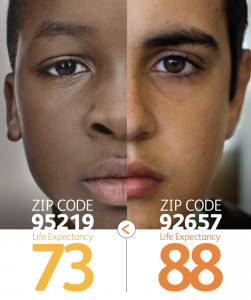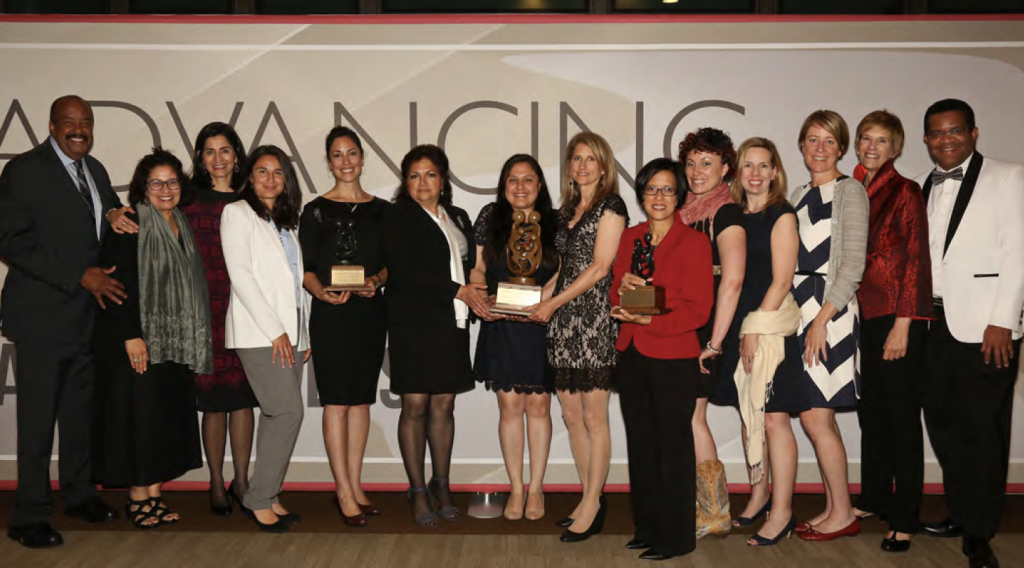Advancing Health Equity Awards, 2017: Highlighting innovative health equity practice in California public health departments
Thursday, June 14, 2018Our surroundings shape our health. For decades, evidence pointing to this truth has been growing, and we now know that the places where we live, learn, work, and play not only influence health outcomes, but that they do so even more than medicine or genetics. We also know that the policies and practices associated with a wide range of environmental and social issues, from air pollution to political disenfranchisement, are causing entire groups to lead shorter, sicker lives than others — and that if we want to address these inequities, we must tackle the power imbalances that underlie them.
 In recent years, researchers, advocates, and journalists have been working to make the public aware of this reality; after all, the first step in solving a problem is realizing that it exists. For example, in 2008, a groundbreaking documentary series called Unnatural Causes: Is Inequality Making Us Sick? shined an unsettling light on the connection between oppression and poor health. Three years later, a campaign sponsored by The California Endowment illustrated major disparities in longevity by zip code. The campaign, which drew on data from the Social Science Research Council, showed that as many as 15 years could separate the California neighborhoods with the longest life expectancies from those with the shortest. And, today, headlines about the link between physical and social environments and our health regularly appear in the news.
In recent years, researchers, advocates, and journalists have been working to make the public aware of this reality; after all, the first step in solving a problem is realizing that it exists. For example, in 2008, a groundbreaking documentary series called Unnatural Causes: Is Inequality Making Us Sick? shined an unsettling light on the connection between oppression and poor health. Three years later, a campaign sponsored by The California Endowment illustrated major disparities in longevity by zip code. The campaign, which drew on data from the Social Science Research Council, showed that as many as 15 years could separate the California neighborhoods with the longest life expectancies from those with the shortest. And, today, headlines about the link between physical and social environments and our health regularly appear in the news.
Fortunately, just as our environments can be designed in ways harm health, they can also be redesigned in ways that promote it. To that end, local health departments (LHDs) across California have been busy brainstorming how they can play a role in crafting and implementing solutions. Along with their community partners, a growing number of health departments are expanding their traditional, service-driven scopes of work and striving to advance health equity — the ability of all people to reach their fullest health potential.
Although their goal is shared, their approaches vary by location. While some are addressing issues like income inequality, education, or employment, others are working on housing, land use, or transportation. Still others are examining how health can be woven into all city and county decision-making.
This transformation from a focus on health services, education, and behavior to a broader approach based on systemic and structural change is beginning to yield results. To recognize exemplary health department practices, support their innovative efforts, and encourage a new standard for health equity practice work in the Golden State and beyond, The California Endowment created the Advancing Health Equity Awards in 2014.
To determine the awardees, a planning committee, made up of leaders from several initiatives and organizations representing public health departments across California, reviews applications and considers how well the LHD health equity practices do the following: contribute to building power in communities; work directly with residents and communities most impacted by inequities; work directly with social, economic, racial, environmental, and/or climate justice organizations; use cross-sector collaborations to change public or private policies and practices related to social determinants of health; shift people’s understanding of health from a focus on health care and individual behaviors to a focus on the social determinants of health and health equity; and engage in internal institutional change that drives changes external to the department.
In 2017, at a gala in Los Angeles, the planning committee named three awardees: the Public Health Division of Napa County’s Health and Human Services Agency, the Health, Policy and Planning Program of the San Mateo County Health System, and the Monterey County Health Department. Two awards came with a companion grant of $25,000 to bolster health equity initiatives, and one health department — Monterey — received $100,000 as part of the Arnold X. Perkins Award for Outstanding Health Equity Practice.*

Read on to learn more about health equity and what these local health departments are doing to advance it.
Case studies of the 2017 Health Equity Awardees
- Reframing housing as a health issue in Napa County, California
- Get Healthy San Mateo County: How supporting community leadership can help address the root causes of poor health
- How Monterey County is advancing health equity using a Health in All Policies framework
Download the full series or watch highlights of their work in these videos of Napa, San Mateo, and Monterey counties.
To view past awardees’ work, visit https://www.bmsg.org/resources/publications/health-equity-case-studies-california.
*To learn more about Arnold X. Perkins, the man whose lifetime commitment to social justice and health equity inspired this award, visit https://youtu.be/dGhshRia_UU.
Acknowledgments
Thank you to the members of the Advancing Health Equity Awards planning committee for lifting up this important work: Muntu Davis, public health director and health officer for Alameda County and past president, California Conference of Local Health Officers (CCLHO); Tracy Delaney, executive director, Public Health Alliance of Southern California; Van Do-Reynoso, public health director, Madera County, and past chair, San Joaquin Valley Public Health Consortium; Sandi Galvez, director, Health Equity, Policy, and Planning, Alameda County Public Health Department, and former executive director for Bay Area Regional Health Inequities Initiative (BARHII); Kathleen Grassi, public health director, Merced County, and past Chair, San Joaquin Public Health Consortium; Genoveva Islas, program director, Cultiva La Salud; Melissa Jones; executive director, BARHII; Jahmal Miller, deputy director, Office of Health Equity, California Department of Public Health; Mary Anne Morgan, project director, California Chronic Disease Prevention Leadership Project; Dan Peddycord, public health director, Contra Costa County, and past president, County Health Executives Association of California (CHEAC); and Linda Rudolph, director, Center for Climate Change and Health, Public Health Institute.
Thanks also to Cookie Carosella for contributing reporting to this series, and to the following reviewers for their insights and feedback on the case studies: Nui Bezaire, Napa County Health and Human Services Agency, Operations Division; Carmen Gil, Monterey County Health Department; Krista Hanni, Monterey County Health Department; Jonathan Heller, Human Impact Partners; Jennifer Henn, Napa County Health and Human Services Agency, Public Health Division; Elsa Jimenez, Monterey County Health Department; Shireen Malekafzali, San Mateo County Health System, Health, Policy and Planning Program; Wini McMichael, San Mateo-Foster City School District; Rachel Poulain, The California Endowment; Bob Prentice, health equity consultant and former president (retired) of BARHII; Fahad Qurashi, Youth Leadership Institute; Karen Relucio, Napa County Health and Human Services Agency, Public Health Division; Sandra Witt, The California Endowment; and Cara Mae Wooledge, Napa County Health and Human Services Agency, Public Health Division.
Funding support for these case studies was provided by The California Endowment.
© 2018 Berkeley Media Studies Group, a project of the Public Health Institute, and The California Endowment.




